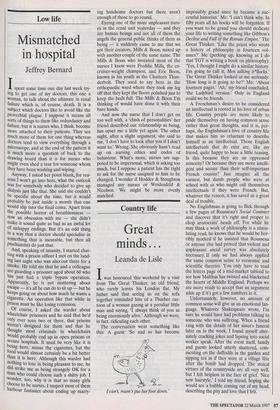Country life
Great minds ...
Leanda de Lisle
Iwas honoured this weekend by a visit from The Great Thinker, an old friend, who rarely leaves his London flat. My father said that seeing us on the sofa together reminded him of a Thurber car- toon of a woman gazing at a peculiar little man and saying, 'I always think of you as being enormously alive.' Although we were, in fact, ridiculing each other.
The conversation went something like this: A guest: 'So and so has become I can't, mum's put her foot down.' impossibly grand since he became a suc- cessful historian.' Me: 'I can't think why. In fifty years all his books will be forgotten. If you want to be grand you should dedicate your life to writing something like Gibbon's Decline and Fall of the Roman Empire.' The Great Thinker: 'Like the priest who wrote a history of philosophy in fourteen vol- umes?' Me (perking up, knowing as I do that TGT is writing a book on philosophy): `Yes, I thought I might do a similar history. I'm going to call it, Men talking b*llocks.' The Great Thinker looked at me seriously: `How long is it going to be?' Me: 'About fourteen pages.' Ah,' my friend concluded, `the Ladybird version.' Only in England could we be friends.
A Frenchman's desire to be considered an intellectual is rooted in his love of urban life. Country people are more likely to pride themselves on having common sense rather than great thoughts, and it is, per- haps, the Englishman's love of country life that makes him so reluctant to describe himself as an intellectual. Those English intellectuals that do exist are, like my friend, quite happy to bear a little teasing. Is this because they are an oppressed minority? Or because they are more intelli- gent and secure than their self-important French cousins? Just imagine all the earnest, but dumb people who were at school with us who might call themselves intellectuals if they were French. But, whatever the reason, it has saved us a great deal of trouble.
No Englishman is going to flick through a few pages of Rousseau's Social Contract and discover that it's right and proper to chop aristocrats' heads off. For while he may think a work of philosophy is a stimu- lating read, he knows that he would be hor- ribly mocked if he insisted that Rousseau or anyone else had proved that violent and unpleasant social survey was absolutely necessary. If only we had always applied the same common sense to economic and scientific theories. You only have to read the letters page of a mid-market tabloid to see how Malthus has twisted and blackened the hearts of Middle England. Perhaps we are more ready to accept that an argument adds up if it's got a few numbers in it.
Unfortunately, however, no amount of common sense will give us an emotional lan- guage. Whatever Shakespeare wrote, I'm sure he would have had problems talking to someone who was suffering. When a friend rang with the details of her sister's funeral later on in the week, I found myself alter- nately cracking jokes and lapsing into social worker speak. After the event itself, family and guests looked utterly shattered, com- menting on the daffodils in the garden and sipping tea as if they were at a village fate after the bomb had dropped. The stoical virtues of the countryside are all very well, but I felt helpless in the face of grief. 'Nice new hairstyle,' I told my friend, hoping she would see a bubble coming out of my head, describing the pity and love that I felt.


































































 Previous page
Previous page